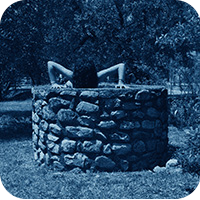Airplane movies
For some reason on my flight to Turkey I was compelled to watch not one but two thrillers that take place on an airplane. I’m not sure my seatmates were altogether thrilled.
Flightplan is more-than-decent. Jodie Foster is excellent as a mom on the verge of hysteria having lost her child on a massive new airplane clearly modelled on the double-decker Airbus A380. I can’t think of when I’ve seen Foster in a role coming apart like that. The suspense is remarkable given the oft-voiced point in the movie “how can you lose a child on an airplane?” And there’s a twist that only Sept. 11 could give us.
No less surprising was Red Eye, Wes Craven’s slow extrication from the horror genre he’s so comfortable in. Yes, you can make a compelling movie two-thirds of which takes place between two people sitting in plane seats. It isn’t as clean as Flightplan, but it has its moments and Cillian Murphy is perfect as a charming seatmate psychopath. Wes Craven does a good job substituting the latent fear of dying because a madman killed you in your dreams with the post-9/11 fear that you never quite know who you are sitting next to on an airplane.
Of course none of this matters. The countdown is on for Snakes On A Plane . You think losing a child on an airplane is tough? How about getting away from several hundred snakes? Kudos to the studio for merging title and plot synopsis in one pithy phrase — a sure sign that this will be a winner.
Also a tip: if you are watching a movie on your laptop when dinner arrives and you have a backpack, just prop it up between your knees. Take the laptop off the tray table and rest it on the pack, stabilizing it with your knees. Watch, eat.
One show, daily
I attended a taping of The Daily Show with Jon Stewart today in NYC. Great fun. Actually way more fun than I thought it would be. I guess I just figured it would be a little sterile in a studio setting, but it was actually funnier. For instance, I always assumed that the correpondent reports that are filed from “Baghdad” and “Washington D.C.” — obviously in front of a green screen — were at least done backstage or something. In fact, the correspondents are mere feet from Stewart on stage and watching his off-camera reaction to their reports is hilarious. Sometimes it felt like he didn’t know what they were going to say, though of course it is scripted and flowing past on the telepromters. The staff cracks up constantly too — and why not? Just great to see how much everyone enjoys the show. There’s a bit of a pre-show standup routine by a staffer that was really quite funny and then Stewart comes out to answer some audience questions. One guy asked Stewart how he felt about the fans who purchased the old show set on eBay and are touring around the country. He said he had not heard about it — which I find very hard to believe. (Thanks for the tickets, Matty!)
Three movies you do not need to see
I had close to 48 hours of flight time while in and in route to China so I watched a bunch of movies, my full Netflix backlog plus a bunch of DVD’s I had ripped to my HD. I scored with House of Flying Daggers (though I didn’t love it quite like I did Hero) and Napoleon Dynamite (the dramatic power of a vacant teenage stare!), but oh did I bomb on my other selections. I don’t mind bad movies, movies who know they are awful and revel in it. But truly terrible movies try real hard and still suck.
You know you have a winner with a line like this: “For maximum damage we use bullets coated in a photon-accelerated luminescent resin. Cuts right through ’em.” For you laypeople, that’s a glow-in-the-dark bullet. Scary! Alone In The Dark was incomprehensible. It started with many paragraphs of written prologue, apparently because test audiences were completely befuddled. It didn’t help. And the funny part is that this movie derives from a game (never a recipe for success) and intends to provide the backstory to it. So when the backstory needs an explicit backstory you know you’re not telling the story right. Part Aliens, part Relic, part Night of the Living Dead, part Men in Black, with a silhouetted Top Gun love-making interlude and dashes of glamband hard-rockin’ video, Alone in the Dark isn’t comically bad (that’d be watchable) — it is irresponsibly bad.
Boogeyman wasn’t much better. When the one and only plot point of the whole movie is for a grown man to confront the fears from his bedroom of youth there just isn’t a lot of room for drama or even fear. The dark is scary. We get it.
Hide and Seek could have been decent. Dakota Fanning and Robert DeNiro do a pretty good job. But it is a plodding movie. The payoff twist at the end doesn’t offset the pain of making it there. Though seeing Elisabeth Shue shoved out of a second-story window is almost worth it.
I, Cartographer
One of the most popular posts on this blog was my copyright-unfriendly screenshotting of images of future Chicago from the movie I, Robot. I really loved the way the film layered future urban development into the current cityscape. I annotated some of the images and developed a map of where I thought the film’s main building, the U.S. Robotics headquarters, was located.
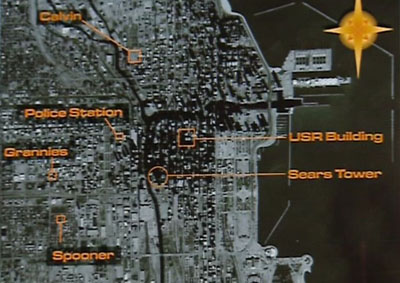
Well, turns out the special edition of the DVD just released contains a shot of a pre-production map (above) that the CGI team used when rendering Chicago 2035. I’ll leave the comparisons to those who care but suffice to say that I think they got the placement of USR HQ and Spoonerville wrong.
God help me if I am turning into the type of person who submits continuity errors to IMDB all day.
Younglings
Readers of this blog know how much my almost-4-year-old loves Star Wars. The kid is obsessed. He actually cried when I shut off the NPR review of the movie (because I didn’t want to know) after they played a snippet of the film’s fanfare. He might have been looking forward to Revenge of the Sith more than I was. Well, I saw it today with some co-workers, without my son. What an excellent coda to two atrocious movies. It almost made up for Jar Jar and the other awfulness. Somebody doctored the script because even Lucas’s dialogue was decent. And the threads tied up for Episode IV were perfectly done. (Check out the young version of Darth’s star destroyer general — Tarkin? Nice touch.)
I was so skeptical of the pre-release warnings about not taking young children to see this movie. My first movie memory is my father taking me to see the original in 1977 so I desperately wanted to do the same with my son. But it ain’t gonna happen. Most of the violence is the normal stylized swordplay, but not all of it. The emperor is scary; Anakin’s final moments gory; and the clincher (stop reading: spoiler comin’) is that the child Jedis are not spared.
I’ll wait for the DVD for my boy. That is, after I go see it by myself again.
How to pass a 14 hour plane flight
Watch two stunning movies and spend the rest of the time thinking about them.
On this latest hop over to China — Shanghai, baby! — I took in two of the best movies I’ve seen this year. First was Hero, a Chinese martial arts movie set in pre-unified China. To call it a movie is maybe to overstate the fact that it was distributed on celluloid (or plastic disc). This is a “picture” in the truest sense. The scenes are so visually stunning I would just pause the action and stare. Like walking through a gallery of vivid stop-action animation, but it is all moving of course — and fast. The choreography puts Crouching Tiger to shame and that’s not easy to do.
Then after a too-brief nap in went Saw, a twisted recommendation from my brother. Not scary in the Ring/Grudge way, but ohmygod was it warped. Basic premise: two unlucky strangers wake up in a putrid bathroom, chained to the piping, and told they will die in 6 hours unless one guy kills the other. Depravity ensues. Since I was in the center seat I was constantly looking to my seatmates to make sure they were still sleeping. Some of the scenes in this movie, even seen peripherally, could probably be considered un-neighborly in a crowded airplane. (It was my DVD, not on the plane’s rotation.) Precisely the opposite — but no less enjoyable — than the rich tableaux of Hero.
Always back up
My 3½-year-old son has become a Star Wars freak in the last few weeks. He watches all five movies (and recently the new trailer) every weekend — though not in order and not even in the order of their chapters. This constantly-on video mash-up does a good job of highlighting patterns in Lucas’s thinking.
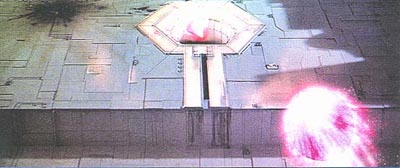
So, here’s my first observation (though probably not the first time this has been observed). Single points of technical failure run throughout the Star Wars movies. You’d think that a culture advanced enough to have intelligent robots and laser swords that don’t singe your retinas when you hold them in front of your face would understand the importance of redundancy. Consider the following.
- Both Death Stars were destroyed by single shots to essentially unprotected (though difficult to reach) Achille’s heels.
- The shield protecting the unfinished Death Star on Endor was disabled by blowing up a single power station.
- Young Anakin destroys the trade federation ship — accidentally! — with a single shot to something.
- The entire battalion of battle droids on Naboo is disabled by the explosion of the trade ship.
In a way, single points of failure are great storytelling devices. They make the goal-driven narrative work. It just wouldn’t be all that compelling to watch Han and company scamper around Endor blowing up power station after power station, would it? Or to hear Han say “Great shot kid, that was one in a million! Now let’s get the other four shafts!”
Japan scares me
First it was Ringu and The Ring, now Hollywood has remade Ju-On: The Grudge keeping only the subtitle. Both these movies are terrifying remakes of terrifying Japanese films. There’s no slashing, no crazed killer, no demonic possession, and few American horror genre clichés. Though neither movie is about technology per se, everyday items of technology are the primary means of effecting the kind of frights that I am coming to associate with Japanese horror filmmaking. For instance, both films use imaging technologies — photos, video, surveillance cameras, etc. — to convey that Something Is Very Wrong with the subjects of the shots.
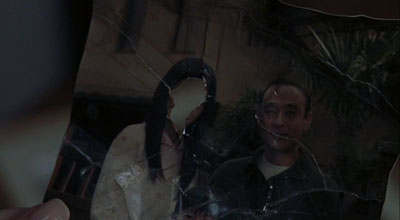
Photograph from The Grudge

Photograph from The Ring
Phone calls figure prominently in both films too and, while this is not unique to Japanese horror, when you step back and look at how all technologies are used in the films it is clear that this level of remove — seeing the bad thing on a TV screen, hearing the bad voice on the phone, noticing the bad person in the background of a photo — are just contemporary versions of the old “spotting the killer standing behind you as you look in the mirror” trick. The fright comes from being one remove from the killer, having some kind of mediation between you and it, and knowing that that mediation offers a false sense of security. You still gonna die.
Maybe in the hyper-technologized culture of urban Japan this technology-as-mirror motif is the ultimate scare. Seems to be for me.
Barile
My great-grandparents came to America in 1903 from a small town called Barile in the region of Basilicata, Italy — basically the “instep” of the boot. I’ve visited Basilicata twice — more on that in an upcoming series of posts — and, though it has made much progress in the last ten years, I often find myself calling it the West Virginia of Italy. Rustic and mostly arid, many of the towns in the region are built on top of or straight out from sassi, the caves carved into soft rock that have formed the homes of inhabitants since well before Roman settlement of the peninsula.
Mel Gibson’s The Passion of the Christ was shot mainly in Matera, Basilicata, the town with the most striking sassi in the region. Shortly after seeing The Passion I learned that Gibson was merely following the Italian filmmaker Pier Paolo Pasolini in shooting a life of Christ in the region. In 1964, Pasolini released Il Vangelo secondo Matteo, a cinema vérité treatment of the gospel of Matthew using non-actors from Basilicata. I’ve read that Italian audiences actually demanded subtitles because the Albanian dialect of the “actors” was too difficult to understand. There’s absolutely no dramatic flourish in the film (a path Gibson diverged from in minute one of his film). This is Christ-as-peasant-among-peasants, seen from ground level. Call it Reality Hagiography.
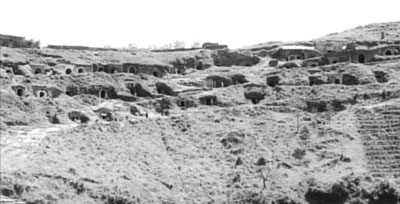
The sassi of Barile form the backdrop of the “slaughter of the innocents” scene. It is hard not to laugh at the centurions as they scamper up and down the hillside slashing at mothers and babies (some of whom fly out of embraces a little too easily). The film is likely to irritate modern viewing sensibilities for one reason or another, especially since the English dubbing is just awful. But I applaud the effort in the context of when and where it was made. If you’re going to shoot Christ as a man of humble origin you’ll not err in choosing Barile as a home town.
Compare the shot from the film above to a panorama of the same caves, now private wine cellars, taken last year.
Zombie comedy
Some people with whom I’ve shared my Netflix queue using the new Friends feature think I watch too much horror. True, some of the worst movies I’ve rented fall into this category. Maybe that’s what makes Shaun of the Dead such a great movie. On the surface this British “romantic comedy with zombies” is just a parody of the undead-run-amok flick. But also in way it is a double-parody, implicitly mocking the now-established horror parody subgenre (think Scream and its offspring).

The movie is simply hilarious. A scene where Shaun argues with his slackass friend about which of his vinyl record collection they should fling at approaching zombies approaches perfection. And you just know the whole time that the final stand against the hordes will happen at the local pub.
Describing zombie behavior, one of the characters notes that they are “Vacant, with a hint of sadness. Like a drunk who’s lost a bet.” This parallel between the modern slacker and the classic revenant runs throughout the film and provides seemingly endless fodder for joke-making.
OK, back to the crappy horror in my queue …


